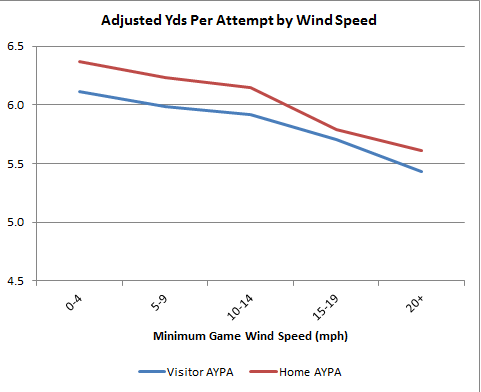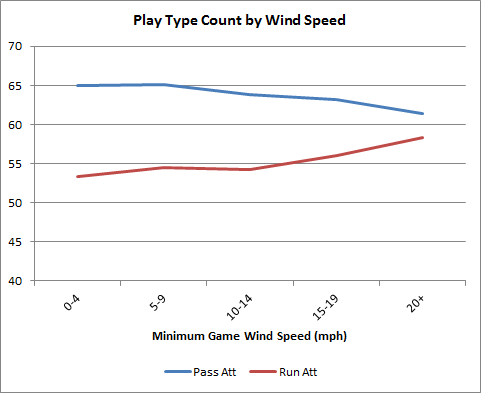As the 2016 NFL season rapidly comes to an end and with the start of the playoffs right around the corner, the weather this time of year can play a bigger role in the outcomes of games and/or performances of individual players as compared to earlier in the year. Many football games are impacted by the weather, and some teams appear to have an advantage over others. Whether you are a casual fan of a particular team or a hard-core fantasy sports enthusiast, weather variables can mean the difference between a victory or a defeat.
There are a variety of weather variables at play here including high heat indices ( which is the combination of warm temperatures and high dewpoints), extreme cold, strong winds, rain and snow.
Not every game is meaningfully impacted by the weather. In fact, many NFL teams play their games in a dome (where weather is never a problem) or in a location where bad weather is rare (hard to find fault with an average weather day in Tampa Bay this time of year). So, to try to find a team or a player with an advantage due to the weather, concentrate on games where the weather can cause conditions that can positively or negatively impact them.

High heat indices are common in Miami, Tampa Bay, Charlotte, North Carolina and other outdoor southern locations early in the season. However, the impacts of high heat indices on athletes are tough to predict. Generally, larger athletes on the offensive and defensive lines are impacted the most. In reality, high heat indices are generally thought of having little impact on the game because the offense does not have a measurable advantage over the defense or vice versa. This time of year, besides an occasional game in Miami, this weather variable does not play a role.
Extreme cold can cause players to have trouble gripping and/or holding on to the ball. The ball becomes more difficult to kick, pass or catch. The increased air density of extremely cold air means a kicked or thrown ball will not travel as far when compared to more benign weather conditions.
Strong winds can cause the quarterback (QB) to not be able to throw the ball where they want to or make a field goal attempt to miss badly. Studies have shown that as winds become stronger than 18 mph, the flight of a thrown or kicked ball is altered. The short passing game may take on an increased role while teams abandon the deep passing game (see image 1). The passing and kicking games may suffer while running backs (RB) may benefit as more of the plays being called are running plays (see image 2). The wind at the kicker’s back may actually help them as some distance is added. Another wrinkle to the wind is whether it is blowing across the field or from end zone to end zone. Also, winds where stadiums are open on one side can swirl, increasing the difficulty of predicting the flight or a thrown or a kicked ball. Strong winds are a meteorological variable that we can generally predict a few days in advance.

Rain and snow is a huge concern for athletes and coaches in the NFL. If the rain or snow is light, the offense, especially the wide receivers (WR) and QBs, may have a small advantage. Why? Because they know where they are going on a certain play while the defensive player has to react to them. While the defensive player is reacting to an offensive player’s moves, there is a greater chance of slipping or losing footing. This helps, or should at least in theory, the offense.
If the rain or snow is steady or heavy, then all bets are off. Both the offense and defense have trouble with their footing and gripping the ball, especially the QBs and WRs. The RBs have some advantage because more of the plays called may be running plays. A great example of this is when the Eagles hosted the Lions in a very snowy game Week 14 of the 2013 season. Check out the highlights of this game. The snow, like shown in the highlights, is a classic example of advantages RBs can have. LeSean McCoy, RB of the Philadelphia Eagles at the time, had a very good game. As the highlights feature, the slippery field played a role. Quite a few points were scored in this game, exhibiting that not all bad weather games are low scoring matchups.
Games this weekend that may be affected by the weather:
Thursday night
LA@SEA
No chance of precipitation. Very cold for Seattle standards! Temps in the low 30s, wind less than 10 mph.
Saturday Night
MIA@NYJ
Rain possible. Mild and breezy, temps in the mid 40s to near 50, winds southwest 7-14 mph.
Sunday
GB@CHI
Flurries possible but the big story is the brutal cold. Temperatures will only be in the low single digits (0-5) and with a 10-20 mph wind wind chills will be in the extremely dangerous to be outdoors level, feeling like -20 to -40.
CLE@BUF
Snow. Windy. Cold. Temps in the 20s, winds 15-25 mph.
PHI@BAL
Rain. Temps falling through the 40s. Winds 9-18 mph.
TEN@KC
Extreme cold. No chance of snow. Temps in the low teens. Winds around 10 mph make it feel like it is 0.
DET@NYG
Rain. Breezy. Mild. Temps falling through the 40s, winds 9-18 mph.
PIT@CIN
Cold and breezy with snow showers. Temps falling from the 30s into the 20s. Winds 10-20 mph.
NE@DEN
After being below 0 to start the day, temps will rise to the mid to upper 20s by gametime. No chance of snow, light winds.
Monday Night
CAR@WSH
Cool and breezy with a small chance of rain or snow. Temps near 40, winds 8-16 mph.